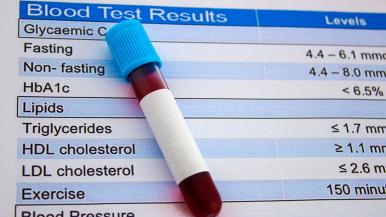Cholesterol is a fat-like substance produced in the liver that is present in many foods including those found in animal products like meat, some dairy products and eggs. The body needs some cholesterol in order to function properly.
There is some evidence that higher blood cholesterol levels increase a person’s risk for developing heart disease or having a heart attack or stroke. Those with high cholesterol usually don’t have any symptoms. That’s why it’s important to get a cholesterol test at least every five years, starting at age 20. A cholesterol test can tell you:
- Total cholesterol — A total cholesterol level of less than 200 mg/dL is desirable, 200-239 mg/dL is borderline high and 240 mg/dL and above is considered high.
- LDL (bad) cholesterol — LDL cholesterol can cause plaque build-up on the walls of arteries. The more LDL there is in the blood, the greater the risk of heart disease. An LDL level less than 100 is considered optimal, 100–129 is near optimal, 130–159 is borderline high and above 160 is considered high.
- HDL (good) cholesterol — HDL cholesterol helps the body get rid of bad cholesterol in the blood. The higher the level of HDL cholesterol, the better. A level of 60 and above is optimal and a level of less than 40 is low and is considered a risk factor for heart disease.
Each time you have your cholesterol checked, record the new levels and the date of the test. There are lifestyle changes and medications available to help control cholesterol, and therefore cardiovascular health. Remember to have yourself tested at least every five years or as recommended by your physician.




